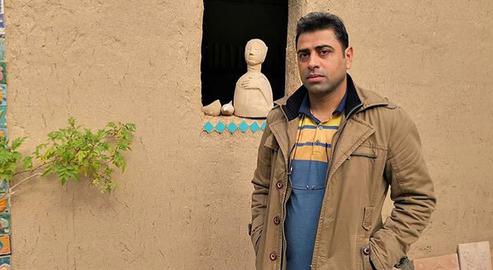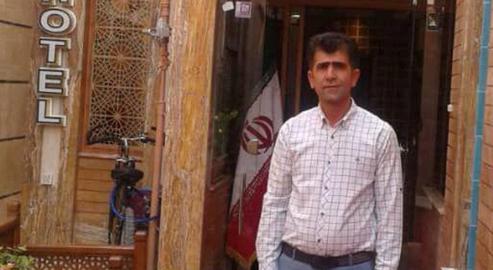A jailed activist has released an audio file describing the torture endured by inmates at Gharchak Prison, including the brutal treatement of female prisoners.
“I can’t take anymore. I hear the voices of the tortured, it does not stop ringing in my ears,” Sepideh Gholian, a workers’ rights activist sentenced to 18 years in prison, said in the recording. “They are imprisoned under whips, lashes, and brutality. Sexual discrimination has broken them and they have no way to freedom.”
Six other activists have also recently been given long jail terms and sentenced to lashes. Together, they face 110 years in prison and 74 lashes for participating in the 2018 Haft-Tappeh Sugar Factory protests.
“I’m waiting every minute to hear more fake news or conspiracy theories from IRIB [Islamic Republic of Iran Broadcasting, the state-run media] against me,” Gholian said.
Gholian was initially arrested in November 2018 and then again on January 20, 2019. She sent the audio file from inside Gharchak Prison in Varamin, hoping to inform both the Iranian public and international organizations about the brutal treatment she and other inmates have endured. In the clip, she urges the outside world to help her.
Her family has also endured incredible hardship. Varamin is hundreds of kilometers from where the family lives, in Shush, Khuzestan province. In order to attend weekly 15-minute meetings with their loved one, the family has to travel more than 30 hours. In addition, her mother has been suffering from extreme panic attacks.
Khodarahm Gholian, Sepideh Gholian’s father, told IranWire: “She’s under so much pain and harassment that you wouldn’t believe it. We have to drive 15 hours to Varamin and 15 hours back to see our child for a few minutes. Could there be any torture more than this? Both for her and for us. Sepideh told us that she does not want us to visit her because she’s afraid something will happen to us in this long journey. But this is our current situation. I have six kids ready to get married. God is our witness that we could eat a meal together the first time she was released. After her second arrest we carried on with our lives, but we have not had a single meal all together as a family. Her mother has wanted to commit suicide. She has anxiety and been hospitalized twice already.”
The Charges Against Gholian
Sepideh Gholian has been charged with “joining illegal groups,” “conspiracy against national security” and “propaganda against the regime." She was convicted and sentenced to 18 years in prison in total for the three charges. During her first imprisonment in 2018, she was forced to confess in front of a camera. Shortly after her release, security guards raided her father’s home again and arrested her for a second time. She was detained for six months in prisons in Khuzestan and Tehran. Finally, on September 7, 2019, she was sentenced to 18 years’ imprisonment.
On the recently-released audio clip, which was shared on social media, Gholian says she wants to sue IRIB, other state news agencies and the judiciary. “Tell me how to file a lawsuit? How shall I sue the '20:30' show and Fars News Agency? Tell me: how can I sue the judiciary?”
After her forced confessions were broadcast on IRIB in January 2019, she refused to stay silent. An hour before her second arrest on January 20, she recorded a video in which she described the torture and verbal and physical harrasment that she endured during her interrogations. In the recent audio clip, she mentions the interrogations again. “They kept me in the interrogation room alone for 16 hours straight. I could hear a man getting tortured in the next room. His name was Esmail, and the interrogator was beating him constantly ordering him to confess. You can imagine what I went through, since this was the name of my ‘co-conspirator.’ I did not know that Esmail Bakhsi was released before me.” She also said she could hear that Bakhshi was forced to make insulting comments about himself.
Bakhsi is one of the most prominent figures of the labor movement and a representative for Haft-Tappeh workers, and has repeatedly called for the workers’ union demands to be met. He was arrested in November 2018 along with Gholian and stated after his temporary release that he was placed under intense pressure and tortured during interrogations. He and Gholian were both re-arrested in early 2019.
An Inspiration to Other Women Activists
In the audio clip, Gholian said she was particularly targeted and tortured because interrogators thought, as a prominent and outspoken activist, she might encourage other women to take part in labor protests. “They told me: ‘now you are inviting other women to the protests?’ It was at that point that I found out I was being beaten all these times because I was a woman. And because I climbed the wall of the governor’s building to film the presence of security guards, which the state media was denying. This time Esmail Bakhshi was advocating for women’s rights. In these protests, women were marching next to men.”
She also talks about the judiciary officials’ abuse of her brother, who they took to the prison during Gholian’s first term of imprisonment as a way of intimidating her and forcing her to give a confession. “Simply because I’m a woman and my brother is a conservative man, they threatened me that they would bring him to the interrogation room to get a confession from me.”
After she was released in December last year, Gholian posted a series of tweets detailing her detainment. “I wish the torture was only beatings. They accused me of sexual encounters in a place where no one could hear me scream. That was the most painful torture.”
The civil activist says it is painful to accept that judiciary and security officials are still looking to get a further forced confession from her since she exposed their disturbing and inhumane tactics. She says interrogators have tried a range of tactics to get her to cooperate and to say she had come under the influence of people working to undermine the authorities. “The interrogator told me, ‘you can wear makeup, have any hair color, wear any clothes that you like — even not wear a hijab. Sit in front of the camera and say you were deceived [by someone wanting to undermine the Islamic Republic].’ They told me: ‘help make a documentary about how you were deceived and we will let you go back home to your family. Otherwise, we’re sorry and you won’t get the chance to feel freedom again.’ I did not accept and have now been in prison for many months.”
Gholian’s father also talked about the audio file and what his daughter said. “Yes, her mother and I pray to God to bring Sepideh back to us, but not in a way that they suggest. I’m a construction worker myself, and was also a driver at Haft-Tappeh. The contractors stole my money and did not extend my contract. My daughter was defending the rights of people like me. Why should she say she was deceived? God is her witness that no one believes that. I sold my house to pay for the weekly transportation to go visit her every week.”
Illegal Under Iran’s Constitution
According to Iran’s constitution, any act of torture is illegal and confessions made under torture have no merit in the court of law. But many Iranian prisoners, political or not, have talked about how they have been tortured. Often it is an attempt to make the inmate weak so that he or she will agree to confess in front of IRIB cameras, confirming the judiciary’s pre-written scenario for its suspects. In most cases, when suspects are released from prison or leave the country, they reveal that they were forced to confess under intense torture. Most recently, Mazyar Ebrahimi, one of several people accused of murdering nuclear scientists, spoke to IranWire and exposed the relationship between IRIB and the judiciary and security agencies.
Sepideh Gholian is 22 years old and could serve the next 18 years in prison simply for participating in Haft-Tappeh workers’ protests. But it is her exposure of the tactics used by the Islamic Republic’s security agencies when dealing with political and civil activists and their families that have angered authorities — and specifically, her revelations about the way female prisoners are treated. Gholian may have limited access to the outside world, but the recent publication of her audio clip is enough to exonerate her in the eyes of the Iranian public, and to show what is really going on in Iran’s jails.
visit the accountability section
In this section of Iran Wire, you can contact the officials and launch your campaign for various problems




























comments